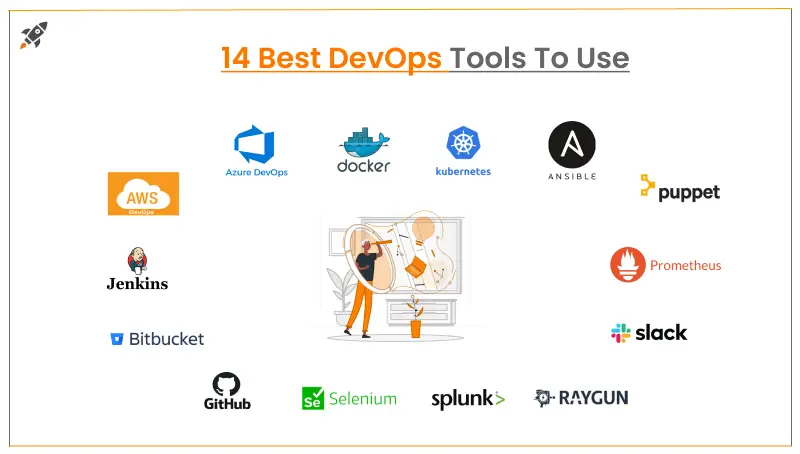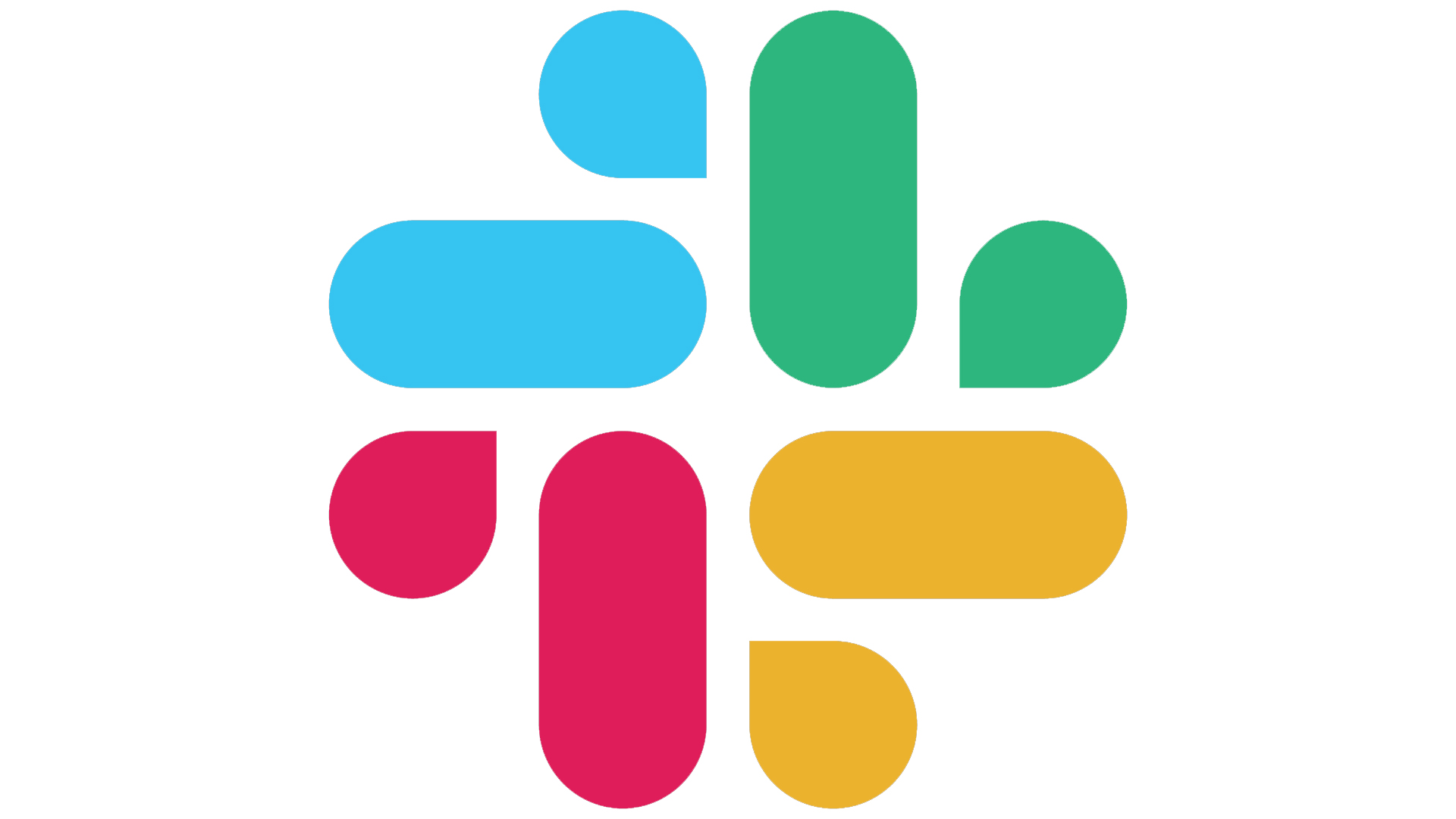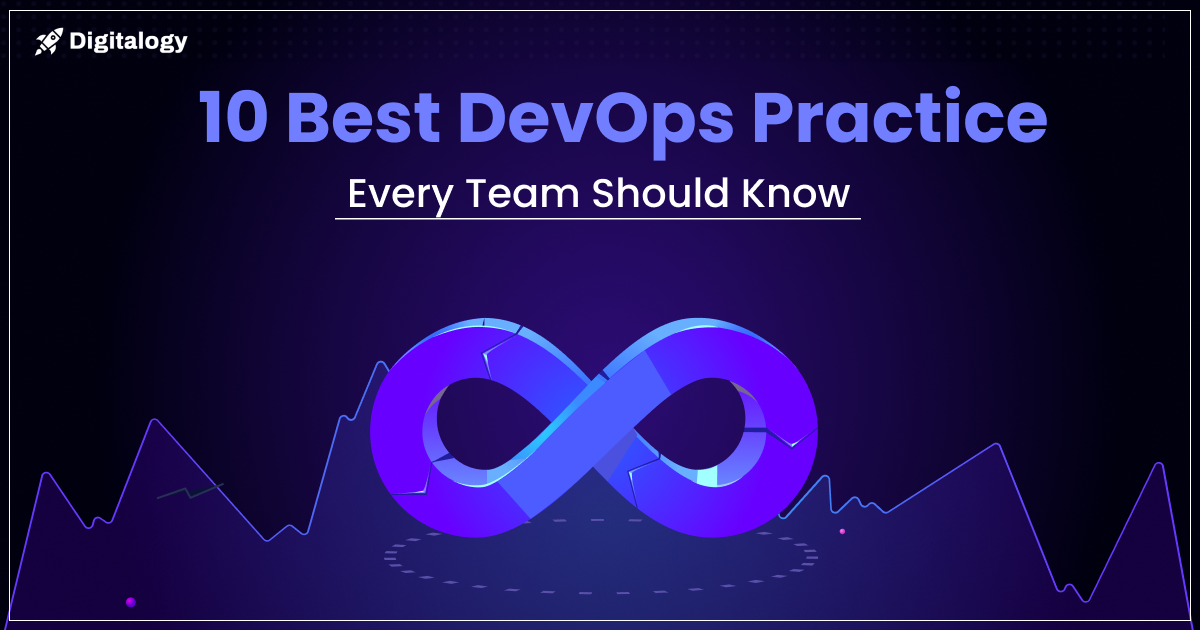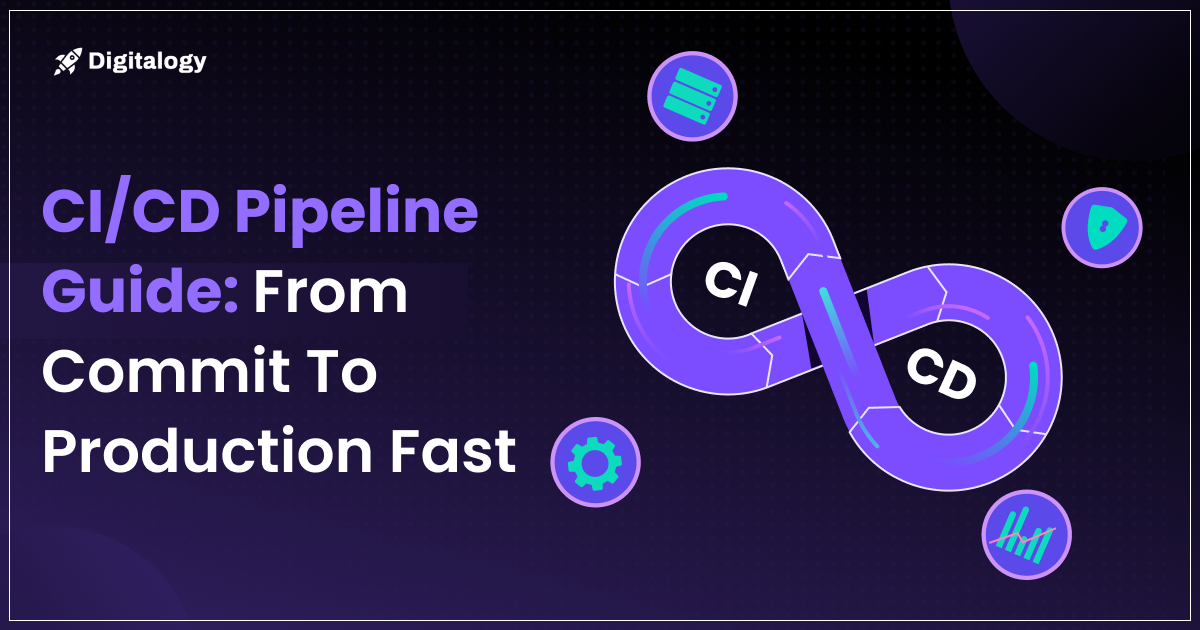In this article, we’ll be talking about some of the ‘Best DevOps Tools’. In the past few years, there has been a dramatic shift in software development from traditional waterfall approaches to more agile and iterative methods.
With these new types of projects come the need for new tools to help manage them. Of all those tools, DevOps tools are the most critical tools, as they haven’t only been a crucial part of this evolution, but are also playing a key role in keeping workplaces efficient and smooth.
DevOps tools are becoming more and more important in today’s workplace. Almost all companies are using them to simplify the workflow of managing code deployments, collaborating with developers, testing new features, and automating tasks like deployment pipelines.
The continuous struggle of companies to come up the efficient DevOps solutions has resulted in some of the best DevOps tools that are being used today in DevOps.
What are the DevOps tools?
DevOps refers to a set of practices that allows the cooperation between software developers and IT professionals. These practices help to build more agile, robust, reliable, and modern systems in order to meet business demands.
Coming to the DevOps tools, are the tools that automate and improve the development and deployment process. Tools like Ansible, Chef, Puppet, and Vagrant provide automation tooling for configuration management. Docker creates containers for applications. Similarly, many other DevOps toolsets are there for a variety of functions and are a vital part of DevOps.
Best DevOps tools for 2024
In the past decade, DevOps has been able to make a significant change not only in the IT sector but also in other sectors. Nowadays, single-sourcing is regarded as a viable option for projects going forward.
In this type of work, developers and operators work together from the beginning of a project, which allows them to share knowledge and create a common understanding of the system they are working on.
In all these operations, the importance of new evolved, and practically best DevOps tools has been immense. This article comes with a list of DevOps tools that will dominate DevOps in 2024 and why these tools should replace your existing DevOps tools in 2024.
1. GitHub
GitHub is a popular tool for developers that helps them to share code and collaborate with other developers on programming projects.
One of the most common pieces of coding that programmers will share on GitHub is source code – programs that can be compiled from code, usually written in a programming language.
These programs are also made public so that others can view them and contribute if they have updates or changes of their own. Since GitHub is a public platform, this makes it one of the most popular and widely used version control tools in DevOps.
All these features ensure that GitHub will keep its position as one of the top DevOps tools for another year to come, and there doesn’t seem to be any full stop to the ever-increasing popularity of GitHub.
2. Bitbucket
Bitbucket is a web-based hosting service mainly for Git and Mercurial. It provides users with both commercial plans as well as free accounts. It provides twenty private repositories for its free accounts, which do not have any time limitations.
Moving fast forward to 2024, Bitbucket Pipelines is a new feature that allows you to create a continuous integration and delivery pipeline. Bitbucket Pipelines is currently in beta, but it offers a lot of potential for automating your build and release process.
Atlassian also offers a cloud-based version of Bitbucket, which is known as Bitbucket Cloud. Just like the clouds of other top DevOps tools, Bitbucket Cloud is a great option if you don’t want to manage your own server. Furthermore, all the source code management tools in DevOps are inspired by Bitbucket.
It’s also a good option if you need to provide access to other people who don’t have permission to administer a server. So, stop imagining your DevOps without Bitbucket in 2024 – it is a must.
3. Jenkins
Jenkins is an extensible open-source continuous integration server in DevOps pipeline tools that is written in Java and can be used on Windows, macOS, or Linux operating systems. It can be used to build and test projects that are written in languages such as Java, C++, Python, and PHP.
Jenkins provides a way of automating the steps that are involved in building and testing software projects to enable faster turnaround times for delivering changes to production code.
Jenkins can also be used to monitor the code repositories for changes and then automatically build and test the new code once it is committed to version control, without the need for any manual intervention.
4. AWS DevOps
AWS DevOps tools have been gaining a lot of attention in the last few years. However, there are a few cons to using AWS DevOps. The first is that it can be expensive. The second is that it can be difficult to learn.
Despite these cons, AWS DevOps is a great way to deploy applications quickly and easily. Being built on Jenkins, AWS DevOps is a service that enables you to create, deploy, and manage applications on the AWS cloud.
With AWS DevOps, you can use code to define how your application should be built & deployed and then use the AWS DevOps console to automate the process. It also enables you to track the status of your deployments, get alerts when something goes wrong, and a lot more about your deployments.
This leads to improved collaboration and better-quality applications and makes it a tool that is going to be a vital part of the leading best DevOps tools of 2024.
5. Azure DevOps
Azure DevOps Tools is a cloud-based platform for software development that enables developers to release code faster and helps organizations to ship better software.
It integrates with other Azure services, such as Azure Pipelines, Azure Boards, and Azure Repos which makes it possible for developers to manage their entire software development lifecycle in one place.
Azure DevOps has a number of features that make it the top CICD solution.
These include a gallery of templates, compatible with other Microsoft products, built-in integrations with popular source control systems, and support for multiple programming languages.
Azure DevOps also offers third-party integration to over 400 enterprise applications. This makes it possible for large companies to integrate their systems into one common platform, which saves time and money too. Azure is surely to be the critical part of the most popular DevOps tools as we enter 2024.
6. Docker
Docker is an open-source project, its main function includes automating the deployment of applications inside software containers. Containerization tools in DevOps are very limited, and this is one of the reasons behind the widespread appreciation of Docker.
It has become popular in the DevOps community for many other reasons as well, Docker makes it easy to package and ship applications, along with providing a consistent environment for applications to run in.
Furthermore, Docker can also be used to manage distributed systems. In fact, lately, it has been one of the main uses of Docker across the IT world.
On top of all these, Docker provides several other secondary features, such as the docker file system to specify what should be in the container; building images automatically by reading the instructions from a Dockerfile; and distribution to make the images available to other developers.
Docker also has experimental support for Windows Server applications, and as things stand, we can foresee a great future for Docker as we enter the year 2024.
7. Kubernetes
Kubernetes is an extremely powerful tool that can help you manage your containers more effectively. It is a tool for deploying, updating, and scaling containerized applications that were originally created by Google.
Being a system that automates deploying, scaling, and operating application containers, Kubernetes provides a way to manage your applications in a replicated environment with less human administration.
On top of that, Kubernetes also allows for applications to be automated in a cloud-computing environment through the use of YAML files which also have the capability to apply labels and adjust configurations.
With it being an answer to a lot of difficult questions in DevOps, Kubernetes is here to stay, and 2024 will mark its vitality when it comes to DevOps.
8. Ansible
Ansible is one of the configuration management tools in DevOps that helps you manage all the configurations of the server. It makes it easy to deploy new applications and updates to your servers and to keep track of your server configurations.
Ansible works with a variety of different servers, including Linux, Windows, and Mac servers. Just like Kubernetes, Ansible is also written in Python, and it uses YAML for its configuration files, which makes it a very peculiar tool in DevOps.
With Ansible, you can automate tasks across your entire infrastructure with just a few commands. You’ll save time on repetitive tasks and spend less time waiting for servers to update or deploy new code. With all these features, Ansible is easily going to be a great DevOps tool of 2024.
9. Puppet
Puppet is a DevOps tool that helps fasten and automate the software delivery process. It enables you to define the state of your IT infrastructure, and then it will ensure that your systems are always in that state.
The Puppet language is declarative. Statements are written using an easy-to-read syntax and define the desired state of a system. This is in sharp contrast to imperative programming languages, which define the sequence of steps needed to reach a goal. Here’s an example of what Puppet code looks like:
file { ‘/etc/passwd’:
content => template(‘/tmp/passwd.erb’),
}
The code above will ensure that the /etc/passwd file always contains the contents defined in the template file at /tmp/passwd.erb. If the file is changed, Puppet will automatically update it to match the template.
Puppet has a vast ecosystem of modules that can be used to automate common tasks. For example, there are modules for setting up Apache, MySQL, and PHP. You can also create your own modules to suit your specific needs.
10. Prometheus
Prometheus was created to help manage and monitor data center infrastructure. Over time, it has become a tool that enables organizations to collect metrics and data from systems in order to identify and troubleshoot issues.
Prometheus also helps improve the efficiency and performance of data centers. Organizations that are using Prometheus typically see a decrease in the time it takes to identify and resolve issues. Additionally, Prometheus can help organizations improve the performance of their data centers by providing insights into how individual systems are performing.
2024? Prometheus is going to be a vital DevOps tool for at least a decade ahead, and you can bet on its success in the most difficult of environments.
11. Slack
Slack is a communication platform that was created in 2009. It is used by teams to communicate and collaborate on projects.
It has a lot of features that make it useful for this purpose, such as file sharing, messaging, and voice and video calls.
Slack is popular among DevOps teams because it helps them to move quickly and efficiently. DevOps teams often need to communicate with each other frequently to ensure that they are meeting their goals and Slack allows them to do this easily and effectively.
12. Raygun
Raygun is a DevOps tool that is used to monitor the performance of applications. It helps developers to detect and diagnose errors in their code quickly. Raygun can also be used to monitor the performance of websites and APIs.
The tool adds a small snippet of code to the web pages, which is then used for capturing HTTP requests. This way, it can track errors that are triggered on the user’s side at any given time, including page load performance issues.
Since it is one of the most efficient error-detection tools, its importance is only going to increase in the coming years, and it is going to be a very important DevOps tool in 2024.
13. Splunk
Splunk is one of the top DevOps monitoring tools which is used for log data. Splunk provides a set of analytics, search, and machine learning that are built on the universal machine data indexing language.
Splunk’s dashboard allows users to easily monitor their logs through real-time metrics, including throughput rates, errors, and exceptions. The dashboard also has the option of providing graphs to show information over time.
Splunk also allows users to search through their data, creating alerts based on certain criteria and exporting data for further analysis.
One of the major benefits of Splunk is that it can be used with a variety of programming languages. It currently supports Perl, Python, Java, JavaScript, and C++. With the languages that it supports and the efficiency of its features, Splunk and DevOps will be together for quite a while.
14. Selenium
Selenium is a unit testing framework for web applications that offers a browser-based automation tool used for the functional testing of web applications. Being unarguably it is the most popular web automation testing tool available & the list of DevOps monitoring tools is incomplete without mentioning it.
Selenium automates browsers by simulating user interaction and is a popular choice for web application testing because it enables developers to test in different browsers, and it integrates well with a variety of development tools.
Selenium framework is also integrated with the Continuous Integration tools, such as Jenkins or TeamCity. This reduces manual steps when deploying applications to various environments from one environment to another, and makes it one of the go-to DevOps tools in 2024.
Which DevOps tools are suitable for your organization?
DevOps tools and technologies are a parallel way that the industry has addressed the difficulty in transitioning from traditional development to DevOps. They make it easier for developers and operations staff to collaborate and automate their processes in order to maintain a high level of customer service.
There are many tools available, most of them that we have discussed in the article, that can help you automate your provisioning, deployment, monitoring, and orchestration of the application lifecycle.
Jenkins, Docker, GitHub, Bitbucket, and AWS DevOps are some of the most critical tools for your DevOps team, as the future of DevOps depends upon how effectively and efficiently you can operate the tools used in DevOps.
Do tell us in the comments section which DevOps tools did you choose for your team!
















